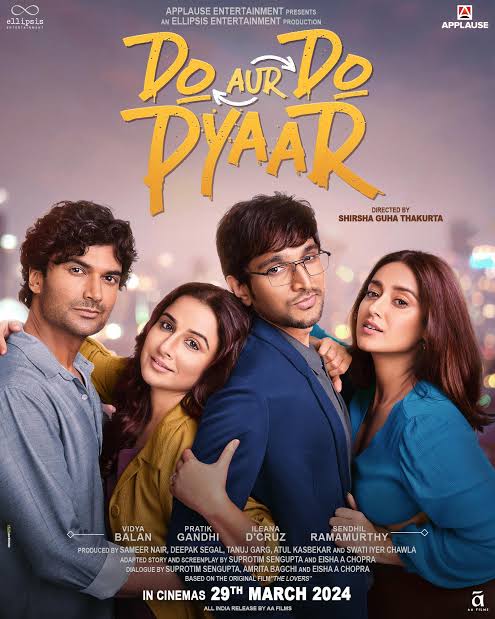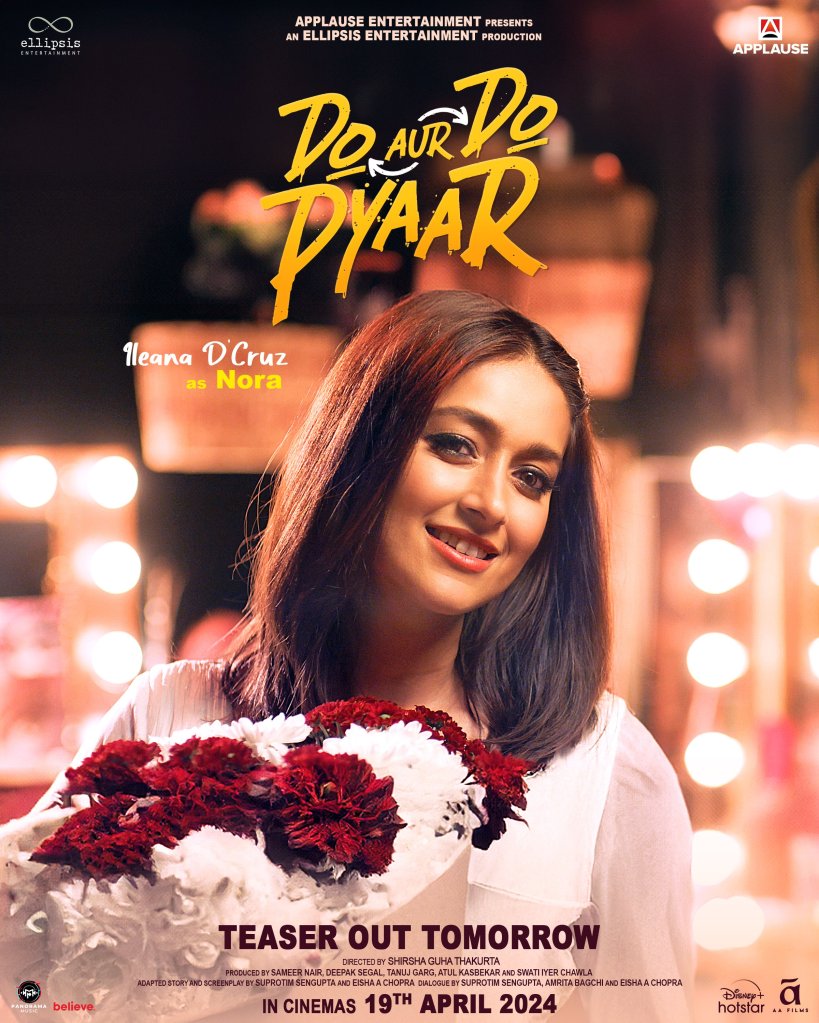[ad_1]
Vidya Balan and Pratik Gandhi lead an impressive cast, but first-time director Shirsha Guha Thakurta’s portrayal of complex relationships lacks conviction.
Rating: ⭐️⭐️ (2 / 5)

By Mayur Lookhar
Dil toh baccha hai ji. Aye Dil-e-Nadaan. Ae Dil Hai Mushkil. How such poetry / lyrics have have entangled people into complex relationships. Do Aur Do Pyaar [2024] banks on Jasbaati Hai Dil (heart is emotional) to navigate through infidel territories, hence the name Do Aur Do Pyaar.

Filmmaker Shirsha Guha Thakurta’s debut feature is an official desi adaptation of American film The Lovers [2017]]. We haven’t seen it, but naturally Bollywood often makes a few tweaks.
Kavya Ganesan (Vidya Balan) and Anirudh Banerjee (Pratik Gandhi) are an estrange couple in Mumbai. Kavya is set on filing for divorce, but Anirudh struggles to muster the courage to confront the issue. Both are entangled in secretive extramarital affairs, further complicating matters. Their respective paramours, Nora (Ileana D’Cruz) and Vikram [Sendhil Ramamurthy], exert pressure on them to end their marriage. Nora shares a deep, intimate connection with Anirudh, while Kavya’s relationship with Vikram appears to be more platonic.
The Kavya-Anirudh relationship seems to have reached a point of no return. However, one intimate night changes everything. It, however, further complicates things for the quartet. Now that is what defines it as a Do Aur Do Pyaar (two and two love) story.
Our perplexity doesn’t arise solely from the extramarital affair or the renewed romance between Kavya and Anirudh, but rather from the prolonged mystery surrounding the cause of their estrangement. If their issues were solely related to intimacy, then why is Kavya engaged in a platonic relationship with Vikram?
Kavya expressed her reluctance towards having children, but there’s no indication that Anirudh desired them either. His concern over the outcome of Nora’s pregnancy test suggests otherwise. In their own words, Kavya and Anirudh reveal that there is no domestic violence, no arguments, and no significant conflicts. On the contrary, Kavya believes that couples who engage in occasional disagreements have more enduring relationships. While this notion may baffle our bachelor reviewer, could it be that minor disagreements contribute to the longevity of Indian marriages? That’s a question best left to those with more experience. However, we remain perplexed about the root cause of the divide in Kavya and Anirudh’s marriage.
Do Aur Do Pyaar initially lures you into expecting another typical Bollywood narrative, where society often blames the ‘woh‘ (paramour) in complex relationships. However, surprisingly, you find yourself empathizing with Vikram and Nora. if not trivialize, director Thakurta and her writers Suprotim Sengupta, Amrita Bagchi, and Eisha Chopra present these complex relationships in a light and unconvincing manner.
Tales of infidelity typically brim with unrelenting tension, as seen in classics like Pati, Patni Aur Woh [1978], Silsila [1981], Astitva [2000], and Kabhi Alvida Naa Kehna [2006]. It, however, is noticeably absent in Do Aur Do Pyaar. The tension only surfaces when the skeletons tumble out in the end, but by then, the viewer is largely disengaged. The heated exchange between Kavya and Anirudh before the climax exposes how they had merely papered over their issues earlier.

Balan is no stranger to complex roles, having been greatly admired for her portrayal of the bold yet troubled Silk Smitha in the biopic The Dirty Picture (2011). However, Kavya’s character in Do Aur Do Pyaar proves difficult to grasp. Leading up to the film, Balan had lauded Sandeep Reddy Vanga’s Animal (2024), praising its unabashed storytelling. Could this have been a subtle message to her fans, suggesting they anticipate something similar in Do Aur Do Pyaar? While Balan delivers a flawless performance, Kavya’s character and her story failed to convince us.
Even as Anirudh Banerjee, Pratik Gandhi still strikes us as unmistakably Gujarati. Banerjee may not possess the gift of gab, but he often entertains with his unintentional blunders. Despite being a successful businessman, he exudes simplicity rather than charm. One wonders how he initially captivated Kavya and later the glamorous Nora. While he doesn’t get along with his in-laws, Banerjee opens up to his sister. It’s heartening to witness a sister-in-law encouraging her brother to summon the courage to break free from his troubled marriage, allowing Kavya the opportunity to seek new love.

Ileana D’Cruz has been enigmatic throughout her career. Though her opportunities have dwindled, she seizes the chance presented by Do Aur Do Pyaar with aplomb. Despite her strong bond with Banerjee, you can’t help but feel no animosity towards Nora, owing to her demeanor. However, it does pique your curiosity as to why a woman involved with a married man is named Nora. Whether in his marriage or extramarital affair, the women in Avinash’s life appear to possess greater wisdom.
Sendhil Ramamurthy effortlessly mesmerizes with his charm. The tall, dark, handsome American actor of Indian descent steps into his second Hindi film role after his acclaimed performance in Shor in the City (2011). Initially, Ramamurthy’s character Vikram feels lacking in depth. The issue lies not in the language barrier but in the forced chemistry between Vikram and Kavya, which feels contrived. It’s unsettling to hear an American character casually endorse extramarital affairs; doesn’t that reinforce a stereotype?
Thakurta’s leading actors deliver commendable performances. However, Do Aur Do Pyaar struggles to convince with its narrative. The lackluster screenplay tests your patience, making the film feel more prolonged than its allotted 139 minutes. Thankfully, the playback music offers some respite, particularly the captivating beats of the Jasbaati Hai Dil song. Additionally, Kartik Vijay’s cinematography and Shailaja Sharma’s production design stand out. The closing visuals linger in your memory long after the film ends.
The tricky subject, especially extramarital affairs, often raises questions about how Bollywood portrays complex relationships. While we respect people’s personal space, as filmmakers, the handling of contentious subjects like in Do Aur Do Pyaar shouldn’t justify DO-uble trouble. Leaving a troubled marriage is one thing, but infidelity often brings self-induced drama and trauma.
Watch the video review below.
[ad_2]
Source link














